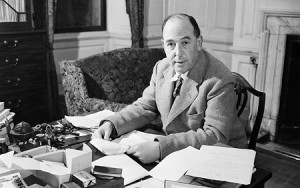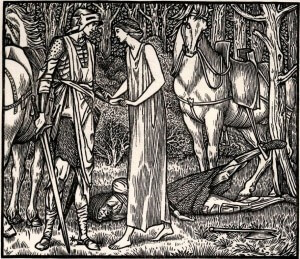I did not write the article down below, following my intro here – I wish I had. It was written by Daniel Morley about C. S. Lewis who has always been one of my favorite authors both in my Protestant years and now in my much fuller and richer Catholic experience.
Lewis was brilliant. He brought many to Christ and though not a Catholic himself he held many Catholic teachings that Evangelicals reject. He points Evangelicals to the fullness of the Christian faith in the Catholic Church.
To prepare you for the short article below remember the words of Pascal and Augustine,
St. Augustine, one of the most brilliant men that ever lived, a saint and philosopher wrote, “You have made us for yourself, O Lord, and our hearts are restless until they rest in you.”
Blaise Pascal, a mathematician, brilliant philosopher and thinker wrote, “There is a God shaped vacuum in the heart of every man which cannot be filled by any created thing, but only by God, the Creator, made known through Jesus.”
I remember the first time I sensed something of what Lewis is talking about below was when I was a small boy laying in the grass looking up at the sky with my father. I asked, “Is this all real or just a dream?”
My father answered, “It is real, the world that God made.” Already in my young years I was anticipating that there was something beyond the physical world that I was experiencing.
The second, and even more profound experience I had of this was when Janet I moved our young family to Switzerland between 1982 to 1983. I remember seeing mountains for the first time. They were the majestic Swiss Alps.
I remember thinking that they were beautiful but I just couldn’t grasp the beauty to its fullness. I took pictures, I climbed them, but I still could not grasp or appreciate fully the beauty and awesomeness in it’s fullness. It was frustrating to me.
If I had been alone I would have enjoyed it to some degree but not as much as I did with my wife at my side. Being with her I could grasp and enjoy it a bit more than I could have if I were alone.
I realized something at that moment about communion in the body of Christ. It also made me understand more deeply how two could be made one and the beauty of a husband and wife the way God created them in his image. I can enjoy beauty and goodness and love better with someone else then by myself alone.
I knew at that time that beauty and glory and goodness could be appreciated truly but not exhaustively. It was something that drew me towards heaven, towards our eternal destiny where we would be able to appreciate things in their fullness because that’s the state in which God has created us to live.
In our physical state we share something in common with the animals but as spiritual beings we are created for eternity. We will never be able to be fully actuated until we are there, with God in the eternity for which we were created. That is what we were created for ultimately. Beauty and longing here are only a foretaste.
C.S. Lewis’ Ingenious Apologetic of Longing
Daniel Motley | Fri, August 7, 2015 | Misc. 8

-
Save
He identified this feeling with the idea of sehnsucht, a German word meaning “longing” or “desire”. Sehnsucht appeared in many of Lewis’ favorite works of literature, including Norse mythology, the poems of Wordsworth, and the children’s stories of George Macdonald. It was “that unnameable something, desire for which pierces us like a rapier at the smell of a bonfire, the sound of wild ducks flying overhead, the title of The Well at the World’s End, the opening lines of Kubla Khan, the morning cobwebs in late summer, or the noise of falling waves.”

The desires that spring up in us—those for love, safety, security, belonging—are never truly satisfied here in this life. Rather, they are pointers to another place, somewhere inaccessible to us now. Like the “forward-facing nostalgia” of sehnsucht, this feeling points us toward the heavenly home for which we were created.

-
Save
In The Weight of Glory, Lewis argued that we’ve all experienced this longing—and are embarrassed by it. Sehnsucht is “the secret also which pierces with such sweetness that when, in very intimate conversation, the mention of it becomes imminent, we grow awkward and affect to laugh at ourselves; the secret we cannot hide and cannot tell, though we desire to do both.
We cannot tell it because it is a desire for something that has never actually appeared in our experience. We cannot hide it because our experience is constantly suggesting it, and we betray ourselves like lovers at the mention of a name.”
But what is the source of these longings? As a young man, Lewis believed that such feelings existed for their own sake. One must chase such longings wherever they led, hopefully ending up someday with “the Real Thing”.
However, Lewis later argued that these desires were planted by God to point us to his Son. “Glory, as Christianity teaches me to hope for it, turns out to satisfy my original desire and indeed to reveal an element in that desire which I had not noticed. By ceasing for a moment to consider my own wants I have begun to learn better what I really wanted.” Our desires ultimately point us to the Father who accepts us in Christ.
A scene from The Chronicles of Narnia perfectly captures Lewis’ idea of sehnsucht. Traveling west to meet Aslan, the protagonists eventually take notice of their surroundings.
It still seemed to be early and the morning freshness was in the air. They kept on stopping to look round and to look behind them, partly because it was so beautiful but partly also because there was something about it which they could not understand.
“Peter,” said Lucy, “where is this, do you suppose?”“I don’t know,” said the High King. “It reminds me of somewhere but I can’t give it a name. Could it be somewhere we once stayed for a holiday when we were very, very small?”
“It would have to have been a jolly good holiday,” said Eustace. “I bet there isn’t a country like this anywhere in our world. Look at the colors. You couldn’t get a blue like the blue on those mountains in our world. . . .”
Lucy said, “They’re different. They have more colors on them and they look further away than I remembered and they’re more … more … oh, I don’t know.…”
“More like the real thing,” said the Lord Digory softly.



This Post Has One Comment
And Jesus hanging upon the cross says, “I thirst.” Mother Teresa of Calcutta has this message on the crucifixes at all of her homes around the world, because Jesus, perfect in His divinity, nonetheless thirsts for our love. He, too, then, undoubtedly experienced in His human nature this longing for our true homeland. Monsignor James Shea, President of the University of Mary, in North Dakota, has a powerful reflection, “Glimpses Along the Way of the Cross” (available at http://www.LighthouseCatholicMedia.org ), in which he speaks of the most poignant feature of Jesus’s passion, namely, His loneliness. God “longs” for us, just as we long for Him.
Comments are closed.